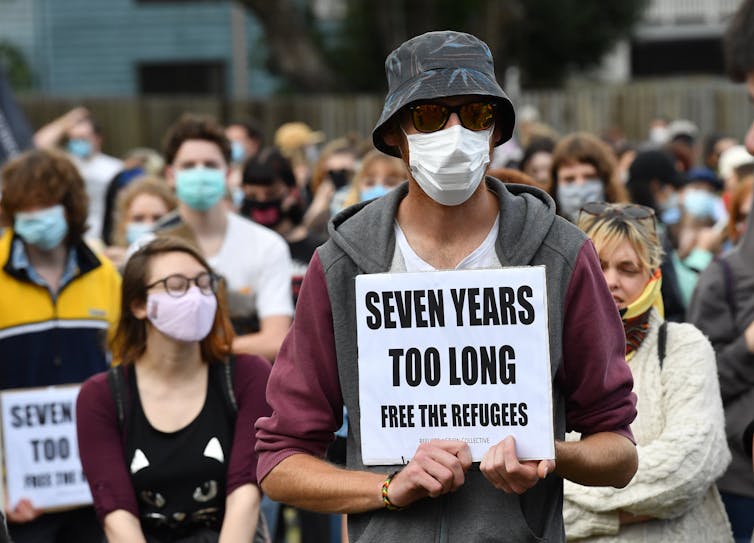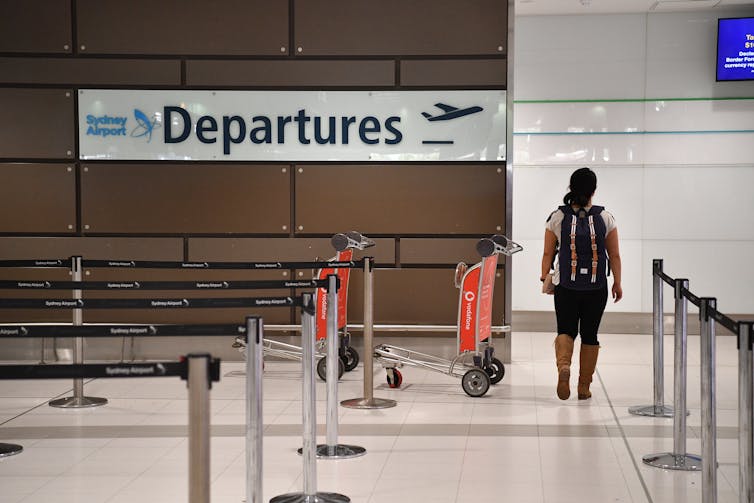With our borders shut, this is the ideal time to overhaul our asylum seeker policies
- Written by The Conversation
It is virtually impossible for anyone to travel to Australia at the moment due to COVID-19 restrictions — let alone those seeking asylum. But even before the pandemic, it was very difficult for asylum seekers to make their way here.
With our borders completely shut, this is an opportune time to reflect on what our asylum seeker policy could look like in a post-pandemic world.
Completely closing our borders to those in need of protection is neither sustainable nor defensible as long-term policy. Australia cannot expect other countries to step up and provide protection while we turn our backs to those in need.
Our current system is arbitrary and ad hoc
The major political parties have made it clear they do not want to see asylum seekers coming to Australia by boats again. But it is hypocritical to take such a position without providing alternative safe pathways for asylum seekers to get here.
One such pathway is air travel. Before the pandemic, it was possible for people who qualified for tourist, student or other types of visas to fly to Australia and subsequently apply for protection.
But those coming by plane typically faced pre-screening and were often denied boarding – precisely because they fit the profile of someone who might claim asylum.
At Australian airports, border officials also use a highly discretionary system to identify and cancel the visas of potential asylum seekers before even considering their protection claims. This places these individuals at serious risk of refoulement to persecution or other serious harm.
This process has resulted in refugees being handcuffed and detained, simply for raising a protection claim in the airport. Some are only detained briefly and promptly placed on a flight home, while others spend months or years in immigration detention while their claims are assessed.
These policies not only prioritise removal or visa cancellation over protection, but actually serve as a disincentive for people to apply for protection at the airport.
 It’s been seven years since Australia started transferring asylum seekers who arrive by boat to offshore detention facilities.
Darren England/AAP
It’s been seven years since Australia started transferring asylum seekers who arrive by boat to offshore detention facilities.
Darren England/AAP
Ensuring access to protection
With COVID-19, we have a rare opportunity for a policy reset. Maintaining the integrity of the system is important, and we do not dispute the need to have systems in place to fairly and efficiently distinguish between those who need protection and those who do not.
The problem is the discretionary nature of the present system has given rise to an arbitrary approach that places too much power in the hands of border enforcement officials with no background or training in identifying people in need of protection.
Read more: How refugees succeed in visa reviews: new research reveals the factors that matter[1]
In our new policy brief[2] for UNSW’s Kaldor Centre for International Refugee Law, we make several recommendations for how to improve the system.
First, we argue people’s visas should not be cancelled while they are in immigration clearance solely because they seek to lodge a protection claim in Australia.
This a breach of the UN Refugee Convention[3], which prohibits penalising asylum seekers for “irregular entry or presence” in a country where they are looking for protection. It also goes against the principles of non-discrimination in international human rights law.
 The current process for evaluating asylum claims at airports is arbitrary and unfairly harsh.
BRENDAN ESPOSITO/AAP
The current process for evaluating asylum claims at airports is arbitrary and unfairly harsh.
BRENDAN ESPOSITO/AAP
We also argue Australia should pass new legislation to improve screening procedures for asylum seekers at airports, including these changes:
applicants should be interviewed by a trained official from the humanitarian program section of the Department of Home Affairs.
the threshold for referring applicants to the full asylum procedures should be set low. Only those who are clearly not refugees or whose claims are clearly fraudulent should be screened out at the airport.
applicants should have access to legal advice, competent interpreters and officials from UNHCR during both the preliminary decision and review stages. Asylum seekers who raise a protection claim at the airport should be informed of this right and given help to seek such assistance.
detention should only be used as a last resort. If it is required, it should be for the shortest time necessary, proportionate and subject to regular independent review.
applicants should not be removed from Australia until their protection claims have been finally determined, including any available judicial review.
Read more: Refugees need protection from coronavirus too, and must be released[4]
Better tracking of people being turned away
In addition to these changes to the screening process, it’s imperative airlines are not fined for carrying passengers who ultimately receive protection in Australia.
And the Department of Home Affairs needs to improve its data collection practices to start recording reasons for visa cancellations — both within and outside Australia — as well as outcomes of all screening decisions.
This should include establishing a method for recording all protection claims made at or before immigration clearance, and recording all removals of travellers “screened out” after making a protection claim.
Read more: 'People are crying and begging': the human cost of forced relocations in immigration detention[5]
The government has conceded[6] it does not accurately collect such data. This information is critical to assessing the extent to which Australia is complying with its domestic and international obligations.
Australia cannot permanently keep its borders shut to asylum seekers. It’s not only inhumane, but it also goes against our obligations under international refugee and human rights law. When travel to Australia resumes, we need to prioritise protection over deflection and removal.
References
- ^ How refugees succeed in visa reviews: new research reveals the factors that matter (theconversation.com)
- ^ policy brief (www.kaldorcentre.unsw.edu.au)
- ^ UN Refugee Convention (www.unhcr.org)
- ^ Refugees need protection from coronavirus too, and must be released (theconversation.com)
- ^ 'People are crying and begging': the human cost of forced relocations in immigration detention (theconversation.com)
- ^ has conceded (theconversation.com)
















